- Home
- David Downing
Zoo Stationee Page 11
Zoo Stationee Read online
Page 11
Only she doesnt make it.
How did you guess?
Dead or just paralyzed?
Oh, dead. Though I suppose having her in a wheelchair would provide a constant reminder of my guilt. Which is, of course, enormous. I give up my job, despite the pleas of my boss. But the guilt is still too much, so I try and kill myself. And guess who saves me?
Son?
Exactly. He comes home with a couple of Jungvolk buddies to find me head down on the kitchen table with an empty bottle of pills. They rush me to the hospital on the cart theyve been using to collect old clothes for Winter Relief.
And when you come round you realize that you can only atone for your daughters death by becoming the perfect stay-at-home mother.
Hans comes to collect me, takes me home, and tells me he cant bear me being so unhappy and that I can go back to work if I want to. Whereupon I give the speech of my life, castigating him for letting me have my own way in the past, and saying that all I really want to be is a wife and mother. He weeps with joy. In fact we both do. The end.
It does bring a tear to the eye, Russell said. Is it going to make you famous?
Shouldnt think so. But the moneys good, and it will involve some acting.
But no breast-flaunting.
I only do that for you, she said, pulling the nightdress open.
AFTER HED WALKED EFFI to the theater for the Barbarossa matinee, Russell ate a snack lunch at the Zoo Station buffet, climbed up to the elevated platforms, and sat watching the trains for a while. It was something he and Paul did on occasion, marveling at the long lines of carriages snaking in across the bridge from Cologne or Paris or the wonderfully named Hook of Holland. Today, though, he waited in vain for a continental express. There were only the neat little electric trains of the Stadtbahn, fussing in and out of the local platforms.
He walked around the northern wall of the zoo and, for want of something better to do, headed home along the Landwehrkanal. It had been a long time since hed spent a Saturday afternoon in Berlin alone, and he felt unexpectedly disoriented by the experience. To make matters worse it was the sort of winter day he hated: gray, damp, and almost insultingly warm. Even the canal smelled worse than usual.
When he reached home Frau Heidegger was lying in wait. Schachts long-expected dismissal as President of the Reichsbank had been all over the front pages that morning, and she was worried about how this might affect share prices. My Jurgens family gave me some Farben shares after the war, she explained, after press-ganging him in for coffee. Just a few, you understand, but I always thought they might come in handy in my old age.
Russell reassured her that Schachts dismissal was unlikely to have any lasting effect. Unlike the coming war, he added to himself. Or her coffee.
The Führers angry with the Czechs, she said from the kitchen, as if following his thoughts.
What about? Russell asked.
Does it matter? she asked, coming in with the familiar pot.
No, he agreed. He was often surprised by Frau Heideggers perceptiveness, and surprised that he could still be surprised.
I told my brother-in-law what you said about air defenses, she went on. He said he hoped you were right.
So do I, Russell agreed again.
After climbing the stairs to his apartment he wished he hadnt: The combination of muggy weather and full throttle heating had made it feel like the hot room of a Turkish bath. He tried opening a window, but there was no welcome hint of cooler air. He tried reading, but nothing seemed to stick.
He went out again. It was just after fourhe had about six hours to kill. He walked south down Belle-Alliance Strasse to Viktoria Park, climbed to the brow of the Kreuzberg, and found an empty bench with a view across the city. There was even a slight breeze.
The sky darkened, and his mood seemed to darken with it.
He thought about Effi and the film. Theyd had fun that morning, but it was a pretty disgusting piece of work. Did she have any qualms about doing it? She hadnt said so. He couldnt believe she needed the money, and hed heard her views on the Nazi attitude toward women often enough. So why was she doing it? Should he ask her? Was it possible to ask someone a question like that without making it an accusation?
He decided it wasnt, but later that night, halfway down an empty street on their way home from the theater, he asked it anyway.
To make a living? she answered sarcastically.
But you dont. . . . he said, and stopped himself. But not soon enough.
Lots of people think that because my family is rich, Im rich, she said coldly. I took the flat when they offered it. Ten years ago. And I havent taken anything since.
I know.
Then what. . . .
He sighed. Its just so sordid. I hate the idea of you playing in something . . . in playing a part that goes against everything you believe.
That just makes it more of a challenge.
Yes, but the better you do it, the more convincing you are, the more women will think they have to accept all this nonsense.
She stopped in her tracks. Are we talking about my work or yours? she asked. How about your paean to Strength Through Joy cruises? Or your car for every German worker piece. Youve hardly been cutting the ground from under their feet.
He bit back the surge of anger. She was right.
They both were.
THE NEXT AFTERNOON, HE went to the Plumpe. Paul had asked him for a program, and with Effi visiting her family that seemed a good enough reason for going. He had Thomas and Joachim for company, but he missed Paul, and the game itself was direa dull 1-1 draw with Berliner SV. Thomas was subduedlike Frau Heidegger and 75 million other Germans hed noticed the telltale flurry of government antagonism toward the Czechs. Sandwiched between SV supporters on the southbound U-bahn they arranged to have lunch on the following Thursday.
Back at the apartment he found a courier delivery waiting for him: a copy of the previous days Pravda, complete with his first article. His Russian wasnt that good, but as far as he could tell they hadnt altered anything. Approved by the SD, approved by the NKVD, he thought out loud. I should have been a diplomat. More gratifying still was the accompanying bank draft in Reichsmarks.
There was also the promised list of suggestions for future articles. The last-but-one letters of the opening sentencewho thought up this stuff?spelled Cracow. Russell groaned. Two 16-hour train journeys, just for a chat with Shchepkin. At least, he hoped it was just for a chat.
Zygmunts Chapel
THIS IS IT, McKinley said, with the sort of enthusiasm others reserved for stumbling across El Dorado. The object of his excitement was a short cul-de-sac of decaying tenement blocks wedged between railway arches, small industrial workshops, and the Neuköllner Schiffahrtkanal. One forlorn streetlight threw a faint yellow glow over glistening brickwork and rusty iron. It looked, Russell thought, like the sort of place a particularly sentimental German communist would come to die.
They had been looking for it for almost an hour, ever since playing hide-and-seek with their probably imaginary Gestapo tail in the Neukölln branch of the KaDeWe department store. The object of their quest had, according to McKinley, told them to make sure they were not followed, and he had done his best to oblige, leading Russell into the store by the main entrance and out through the kitchens, pursued only by the shouts of an enraged chef. They had then headed east on foot, turning this way and that down a succession of rapidly darkening and profoundly unwelcoming streets. Russell had expected streams of workers returning home, but they had only come across a few, and McKinleys requests for navigational assistance had been met with either guarded suspicion or outright hostility. Russell had wondered whether the young American could feel the money burning a hole in his pocket. There were lights behind the curtains of the reside
ntial streets, but they felt far away.
This street, Schönlanker Strasse, was no exception. The block they were looking for was the last, pushed up against the elevated tracks of what was probably a freight line. As they reached the entrance another source of light came into viewthe red glow of a signal hanging in the darkness.
The limp swastika hanging over the entrance looked like it hadnt been washed since 1933. Entering the dimly lit hall, they found the concierges door. McKinley tried two taps with the door-knockertoo softly, Russell thought, but the door swung open almost immediately. A middle-aged woman with a rather striking face ushered them inside and quickly closed the door behind them.
Who is this? she asked McKinley with an angry gesture toward Russell. She had a thick Rhenish accent, which explained why the American had so much trouble understanding her.
Hes a friend. He speaks better German than I do, McKinley explained, rather in the manner of someone reassuring a foolish child.
She gave Russell another look, thought for a moment, then shrugged. Come through, she said shortly.
The living room was clean but almost bare. There were no comfortable chairs, only a couple of stools beside a small table and what looked like homemade cushions on the floor. A tattered but once-expensive rug occupied the center of the wooden floor. A girl of around five or six was sitting on it, leaning forward over a drawing she was working on. She didnt look up when they entered.
Thats Marietta, the woman said. She gets very absorbed in what shes doing, she added, as if she needed to explain the childs lack of reaction.
Her name, as McKinley had already told Russell, was Theresa Jürissen. She was younger than hed first thoughtaround 35, probablybut she looked both exhausted and malnourished. Only the eyes, a penetrating gray, seemed full of energy.
Please take the chairs, she said, but McKinley insisted that she take one. He remained standing, his lanky bulk seeming somewhat incongruous in the center of the room. Apparently realizing as much, he retreated to a wall.
Have you brought the money? Frau Jürissen asked, almost apologetically. This was not a woman who was used to poverty, Russell thought. This is the only work I can do and look after her all day.
McKinley produced his wallet, and counted what looked like several hundred Reichsmarks into her hand. She looked at the pile for a moment, and then abruptly folded the notes over, and placed them in the pocket of her housecoat. So, where shall I begin? she asked.
McKinley wasted no time. You said in your letter that you could not keep silent when childrens lives were at stake, he said, pronouncing each word with the utmost care. What made you think they were?
She placed her hands on the table, one covering the other. I couldnt believe it at first, she said, then paused to get her thoughts in order. I worked for the Brandenburg health ministry for over ten years. In the medical supplies department. I visited hospitals and asylums on a regular basis, checking inventories, anticipating demandsyou understand?
McKinley nodded.
After the Nazi takeover most of the women in my department were encouraged to resign, but my husband was killed in an accident a few weeks after I had Marietta, and they knew I was the only bread-winner in the family. They wanted me to find another husband, of course, but until that happened . . . well, I was good at my job, so they had no real excuse to fire me. She looked up. Im sorry. You dont need to know all this. She looked across at her daughter, who had still shown no sign of recognition that anyone else was in the room. I suppose I knew from the start that she wasnt, well, ordinary, but I told myself she was just very shy, very self-absorbed. . . . I mean, some adults are like thatthey hardly notice that anyone else exists. She sighed. But I got to the point where I knew I had to do something, take her to see someone. I knew that might mean shed be sterilized, but . . . well, if she stayed the way she is now, shed never notice whether she had any children or not. Anyway, I took her to a clinic in Potsdam, and they examined her and tested her and said they needed to keep her under observation for a few weeks. I didnt want to leave her there, but they told me not be selfish, that Marietta needed professional care if she was ever to come out of her shell.
Did they threaten you? McKinley asked.
No, not really. They were just impatient with me. Shocked that I didnt immediately accept that they knew best.
Like most doctors, Russell murmured.
Perhaps. And maybe they were completely genuine. Maybe Marietta does need whatever it is they have to offer.
So you took her away? McKinley asked.
I had to. Just two days after I left her in the clinic I was at the Falkenheide asylumyou know it? Its just outside Fürstenwalde. I was in the staff canteen, checking through their orders over a cup of coffee when I became aware of the conversation at the next table. I tried to ignore it, but I couldnt. And they were speaking quite normallythere was nothing clandestine about it. In a way that was what was most shocking about itthey assumed that their topic of conversation was common knowledge. As far as the asylum staff were concerned, that is. She paused, and glanced across at Marietta. What they were talking about was a letter which had been sent out by the Ministry of Justice to all directors of asylums. That letter wanted the directors opinions on how they should change the law to allow the killing of incurable children. Should they announce a new law, or should they issue administrative decrees and keep the public in ignorance? This is what the people at the next table were debating, even joking about. Three of them were doctors I recognized, and the woman looked like a senior nurse.
This was all spelled out? Russell asked incredulously. He instinctively trusted hercould see no reason for her to liebut her scene in the canteen sounded like one of those stage conversations written to update the audience.
No, she said, giving Russell an indignant look. They were talking more about how the parents would react, whether they would prefer to hear that their children had simply died of whatever illness they had. It was only when I read the letter that it all made sense.
How? Where? McKinley asked excitedly.
Like I said, I was in that job a long time. I was on good terms with people in all the asylums. I knew I had to see the letter for myself, and I waited for a chance. A few days later a director was called out early, and I pretended I had to work late. I found the letter in his office.
I wish youd kept it, McKinley said, more to himself than her.
I did, she said simply.
You did! McKinley almost shouted, levering himself off the wall hed been leaning against. Where is it? Can we see it?
Not now. I dont have it here.
How much do you need? Russell asked.
Another five hundred Reichsmarks? The question mark was infinitesimal.
Thats McKinley began.
Good business sense, Russell completed for him. She needs the money, he added in English.
Yes, of course, McKinley agreed. I just dont know how. . . . But Ill get it. Shall I come back here? he asked her.
No, she said. Its too risky for me. Send the money to the posterestante on Heiligegeiststrasse. When I get it, Ill send you the letter.
Itll be there by tomorrow evening, McKinley said, as he printed out the Neuenburgerstrasse address.
Russell stood up. Did you have any trouble getting Marietta back? he asked Theresa Jürissen.
Yes, she said. They wouldnt let me take her. I had to steal my own child. Thats why were here in this place.
They all looked down at the girl. Her drawing looked like a forest after a hurricane had hit it. I wish you luck, Russell said.
He and McKinley reached the street as a coal train thundered over the arches, and set about retracing their steps. It was raining now, the streets even emptier, the
rare neighborhood bar offering a faint splash of light and noise. They didnt speak until they reached the tram stop on Berlinerstrasse.
If you get this story out, itll be your last one from Germany, Russell said.
McKinley grinned at him. Worth it, though, dont you think?
Russell saw the excitement in the young Americans eyes, like an echo of his own younger self. He felt a pang of envy. Yes, I do, he agreed.
RUSSELLS FIRST PORT OF CALL on the following morning was about ten kilometers, and several worlds, away from Schönlankerstrasse. The villa, just around the corner from the State Archive in the wealthy suburb of Dahlem, was surrounded by trees full of singing birds, most of whom were probably warbling their gratitude to the Führer. In Schönlankerstrasse it was probably still raining in the dark, but here the sun shone down out of a clear blue sky. The coffee had not been as good since the Jewish cook had been allowed to leave, but everyone had to make sacrifices.

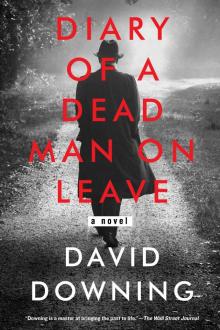 Diary of a Dead Man on Leave
Diary of a Dead Man on Leave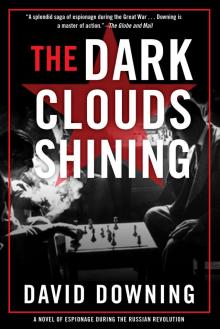 The Dark Clouds Shining
The Dark Clouds Shining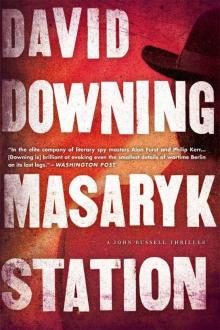 Masaryk Station (John Russell)
Masaryk Station (John Russell)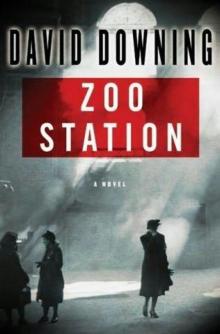 Zoo Stationee
Zoo Stationee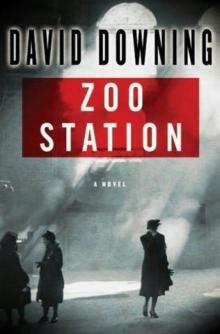 Zoo Station jr-1
Zoo Station jr-1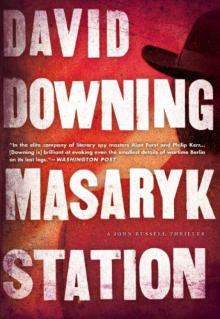 Masaryk Station
Masaryk Station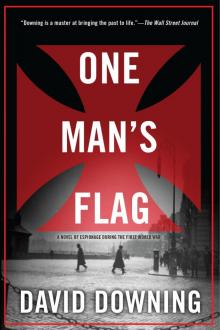 One Man's Flag
One Man's Flag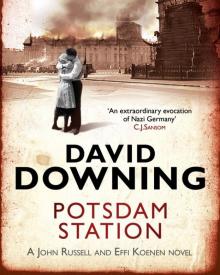 Potsdam Station jr-4
Potsdam Station jr-4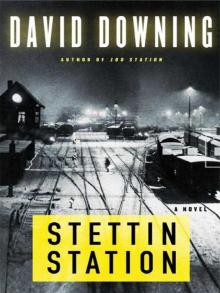 Stattin Station jr-3
Stattin Station jr-3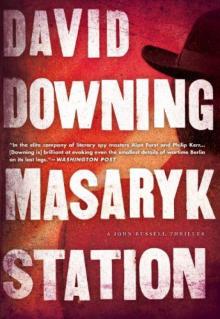 Masaryk Station jr-6
Masaryk Station jr-6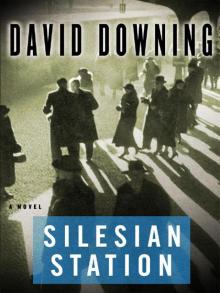 Silesian Station (2008) jr-2
Silesian Station (2008) jr-2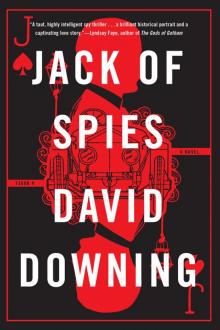 Jack of Spies
Jack of Spies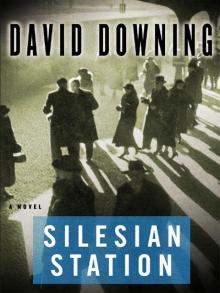 Silesian Station (2008)
Silesian Station (2008) The Moscow Option
The Moscow Option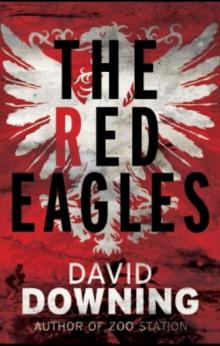 The Red Eagles
The Red Eagles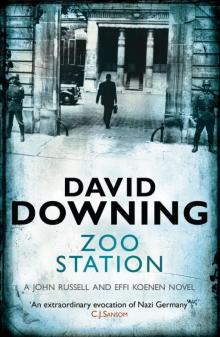 Zoo Station
Zoo Station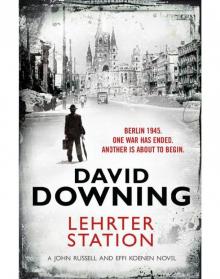 Lehrter Station
Lehrter Station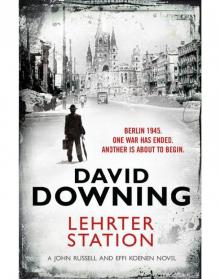 Lehrter Station jr-5
Lehrter Station jr-5